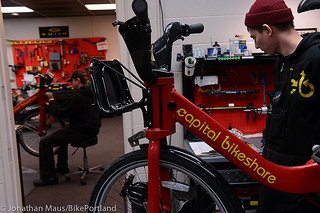Alta Bicycle Share Vice President Mia Birk acknowledged Wednesday that “we definitely make mistakes,” but that her fast-growing company is learning from its possible violation of federal labor rules and taking steps to avoid future wage issues.
Meanwhile, Portland city lawyers say the “prevailing wage” law that Alta may have run afoul of in Washington, D.C., which requires government contractors to be paid at higher than market price, won’t affect Portland’s forthcoming bike share system because it applies only to direct contracts with the District of Columbia or federal government itself.
“… We’re not perfect. We definitely make mistakes. But what we do is we fix them.”
— Mia Birk, Alta Bicycle Share
“We have federal money that is seeding this effort, but technically the city has not entered into a contract with the federal government,” city spokeswoman Diane Dulken said Tuesday.
Prevailing wage rules tend to be highly valued by trades unions because they essentially guarantee that many government contracts go to better-compensated unionized workers, who also tend to be more highly skilled. Oregon has its own such law, though it applies only to “public works” projects.
When Alta was courting the City of Portland’s business last year, it voluntarily committed to a wage floor for its bike share workers: 150 percent of Oregon’s minimum wage, after they’ve worked for at least 90 days. At the moment, that comes to just under $13.50. Full-time workers who remain for at least three months, moreover, will receive “full benefits including healthcare coverage.”
A quick survey of our job listings shows that $13.50 per hour is within the standard range for starting bike mechanics at local shops.
Alta’s contract with Portland also provides for at least 50 percent of bike share hours to be worked by “historically underrepresented and economically disadvantaged people,” a phrase that the contract says may include “women and people of color” as well as “veterans, immigrants and refugees, disabled individuals, formerly incarcerated people and low-income residents.”
“Both Alta and the city want to create good jobs as well as a great bike share system,” Dulken said.
At issue with Alta’s wages in D.C. is the fact that some bikesharing jobs — responding to service calls to fix bikes or making sure docking stations are balanced — aren’t obviously similar to other government jobs.
Paul Breed, a Portland labor lawyer who specializes in wage issues, said this is often a source of dispute in changing industries.
“Classification issues do come up from time to time, and new job categories are created,” Breed said. “It can get complicated, and there are judgments that have to be made about the appropriate classification for the work.”
At the federal level, Breed said, all such judgments are ultimately made by the federal Department of Labor, whose decision on Capital Bikeshare’s wage issue is expected in about a month.
“We submitted info to DOL and are expecting a report soon,” Birk said. “It’s on their timeline. As soon as we get it, we will issue a press release with the information and action plan, if needed. Whenever one is creating something new, as we are doing by creating jobs in this cutting-edge industry, there are challenges and lessons learned, evolution and refinement. We are proud of our work creating new jobs while doing good for individuals and communities, and we are extremely proud of our excellent staff. We’re not perfect. We definitely make mistakes. But what we do is we fix them.”
Based in part on lessons from the D.C. wage inquiry, Birk said, the company has revamped its system for promotions and raises at all its locations, which also include Boston, Chattanooga, Melbourne, New York and Chicago, with San Francisco, Portland and Vancouver BC on the way.
Birk said that in the last two months, Alta Bicycle Share has been hiring its first human resources director, finance staff and legal counsel. Based in part on lessons from the D.C. wage inquiry, Birk said, the company has revamped its system for promotions and raises at all its locations, which also include Boston, Chattanooga, Melbourne, New York and Chicago, with San Francisco, Portland and Vancouver BC on the way.
Meanwhile, 18 former Capital Bikeshare employees have been quiet lately as they hope for what spokesman Sam Swenson has estimated at “more than $100,000” in back pay, including the value of unpaid medical benefits. Swenson sent the following statement in response to BikePortland’s recent publication of Alta’s official statement on the issue.
We caught Mia with her hand in the cookie jar. And instead of fessing up and making amends, she says we’ll have to consult with the FDA to confirm that those cookies she stole were, in fact, cookies. Don’t mind the recipe taped to the jar. In the meantime, ‘We ask for your patience and hope you continue to enjoy Capital Bikeshare.’
Here’s the thing about patience: Healthcare delayed is healthcare denied. Try three years. And as for cookies… Actually, we’re talking about worker’s rights and their bodies.
Mia claims that “most of our jobs in this cutting edge industry are not currently listed in the prevailing wage guidelines.” If Alta didn’t understand the contract and the wage & benefit mandates therein, why did they sign it twice?
There’s nothing cutting edge going on here. Mia saw bike sharing in Paris and decided to replicate it stateside–sans those pesky French labor standards. It’s Bikesharing Walmart-style. Pay workers as little as you can get away with and invest heavily in HR and PR when they find you out.
Why hide behind the DOL when you already know what you owe us? Here’s my guess. Prove me wrong.
Both parties in this dispute have clear interests in shaping public perception, so it’s likely that their war of words will continue. To the extent that this issue affects Alta, an important Portland company, or bike sharing in the Portland area, we’ll keep you posted.



